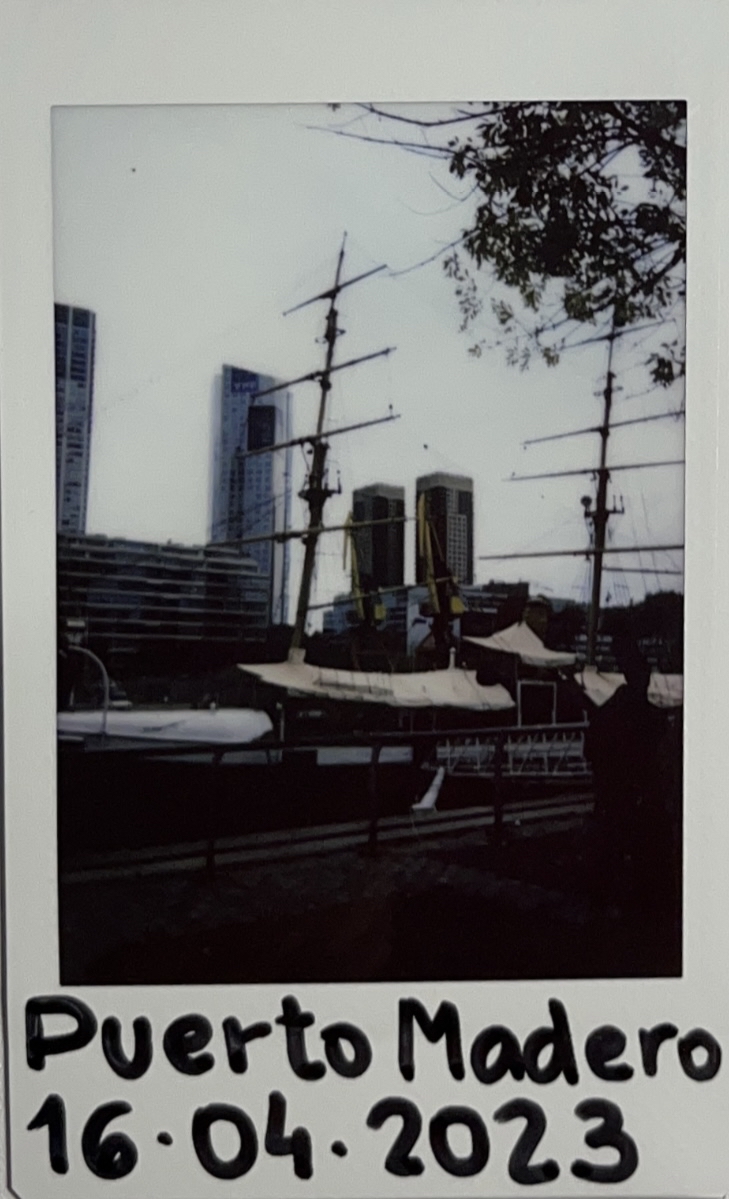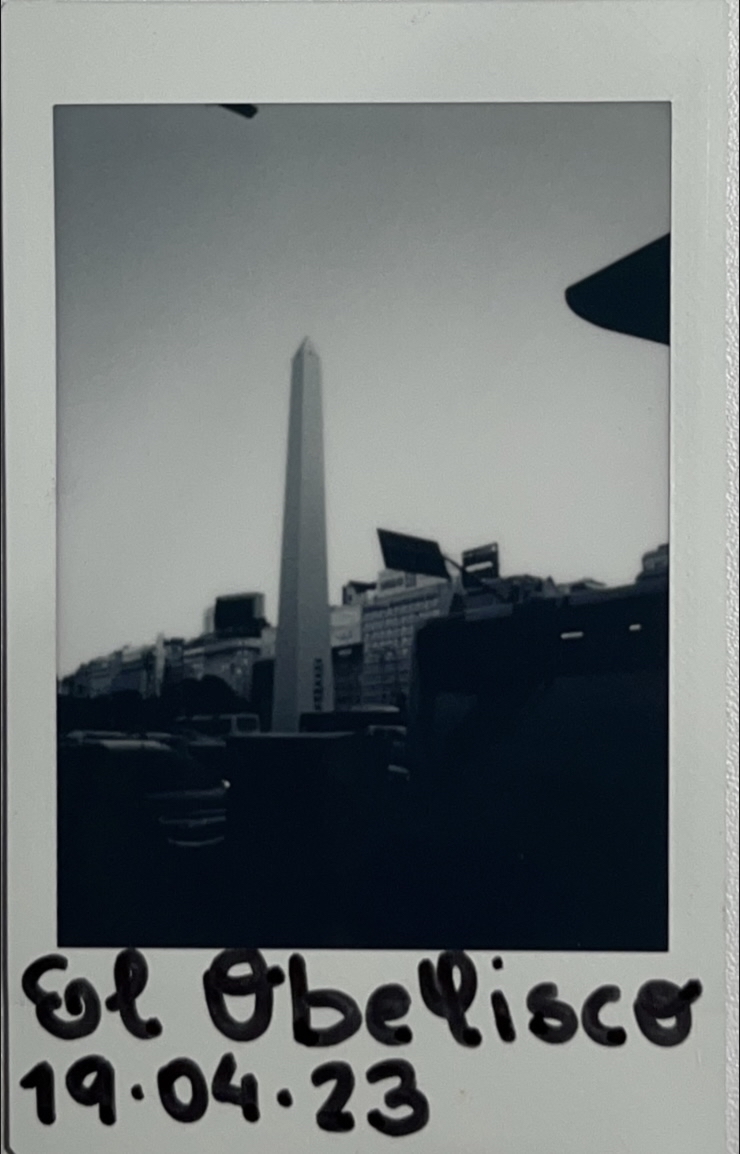Outreachy report #44: April 2023
This month’s report will focus mainly on the trip to Buenos Aires, as it was the most significant event of the month. I had three goals in mind during this trip:
-
To listen and learn;
-
To share and teach;
-
To meet two of our alums!
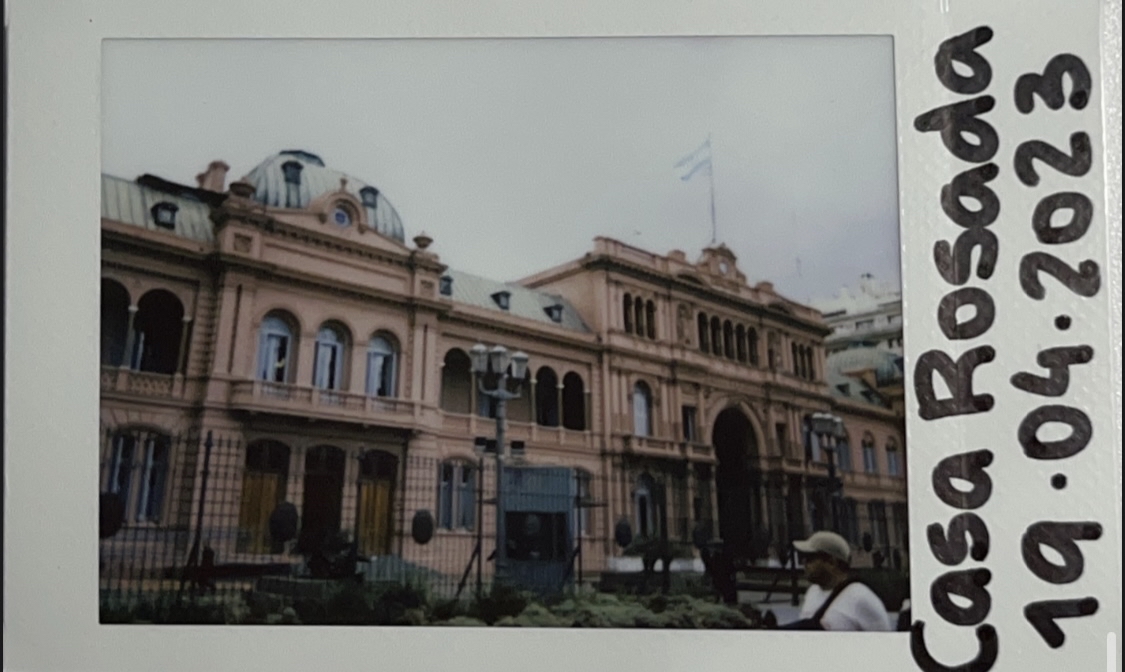
Sunday, April 16
I met some folks from MetaDocencia during the reception, including Melissa Black (Outreachy alum with EDAM Ontology). We mostly introduced ourselves and talked about the current state of social media.
I also met Melissa Mendonça (Quansight, SciPy, MatPlotlib). We talked about mentorship programs and she told me about her experience as a mentor on Google Season of Docs. As a Google Season of Docs alum myself, I’ve observed some of the things she mentioned. It’s interesting to notice how things you would expect to be facilitators (for instance, Google branding recognition) end up working against the program. That made me reflect about Outreachy’s own branding, especially as a program that started taking inspiration from Google Summer of Code—it isn’t unusual for us to deal with and reconcile conflicting perspectives about what to expect from program participants due to the language we’re using or the branding we currently sustain.
For instance, when mentors come to us with the expectation that a project should be completed by the end of internship, we often tell them that we see our program as more of a fellowship of sorts. We emphasize that our metrics for success, above all, are how much an intern has engaged and learned from the community they’ve been working with. We talk about the longevity of free and open project ecosystems as a whole, and how interns should learn to document their work so it can be continued by others.
It also reminds me of legal barriers that may prevent us from promoting Outreachy as an internship program in countries such as Brazil, where internships have a clear legal definition that involves education institutions and intermediaries representing companies and handling internship contracts. Have we outgrown our “internship” label? Can we think of another term that better conveys our expectations and principles?
Monday, April 17
Engaging scientific open source contributors in Latin America
This session, facilitated by Melissa Mendonça, started with the following opening questions:
- Why do we want contributors from LatAm?
- Why are people not interested in contributing?
- For those who are interested in contributing, what are the barriers?
- Open source is global, but funding, connections, conferences, cliques are local. How can we organize in our region?
- If we could change open source to be more suitable for LatAm, what would that look like?
- What are the landscape of differences between OSS within Latin America and other regions of the world?
When deliberating about how to facilitate these discussions, Yani [rOpenSci] suggested a methodology called Circle of Voices: you allow every participant in the room to organize their thoughts by giving them space to write them down, in silence, for a couple of minutes. With the help of a facilitator, every participant is allowed to speak without interruptions. As someone who constantly stressed out about when to jump in in a discussion, especially when I feel intimidated by others, I found it to be a fantastic format.
I wrote the following:
“For reference, Outreachy has 42 alums in Brazil (making Brazil the 4th country with most Outreachy alums) and 10 alums in Argentina. Our current numbers for first, second, and third places with most Outreachy interns are India (277), the US (161), and Nigeria (80). Word-of-mouth is the most prevalent way of discovering programs such as ours. Someone, by chance, learns about OSS in regions such as ours, and spreads the word. It’s difficult to track down how people have this first experience, but some of the common answers are through a professor, a friend, a mentor, or an in-person conference. I’d like to know more about those pivotal experiences. We know that we have a great influx of participants in India and US thanks to Google Summer of Code, which is in a way part of Outreachy’s own origin story. As for Nigerians, we’ve witnessed an impressive increase in applicants and mentoring organizations as soon as we hired Omotola Omotayo, our amazing community manager, and she started promoting our program at conferences and meetings in Nigeria.”
This led to the conclusion that local representation of people is key to outreach. I agree—when talking about this CZI meeting, I often mention having a level a connection with other participants that I find difficult to have with folks from the Global North. In general terms, I feel that, the moment we start talking, we recognize in each other the same struggles and history, especially in terms of Global North colonization. I feel a somewhat deep, mutual understanding between us. Whereas with folks from the Global North, I frequently sense a barrier between us, particularly in terms of choosing what battles to fight and/or electing priorities. I feel distant, disconnected, and ‘othered’.
Following my statement, Yani added the following:
“Lack of knowledge about the opportunity of contributing to OSS is a key barrier. Communication and outreach needs to target not just communities (which exist and have self-organized using the internet) but also to institutions and research institutes. rOpenSci has also done work related to local representation , and is now investing in upskilling and training so that people have the opportunity to contribute.”
This led to a discussion about lone contributors, and how academically centered Latin American contributions to OSS can be. “Creating clear/understandable paths for people to contribute (not limited to code), with clear/shareable guidelines that could be shared across projects” was suggested as a countermeasure. However, another participant shared that they only got involved with free and open source projects because they speak English since they were a child. With English being the de facto lingua franca of technology, “Language barriers are huge.”
Another participant added, “We need to have not just contributors from LatAm but decision makers at the table. (…) No project has the capacity to support an inflow of otherwise well meaning contributors. There needs to be a focus on mentorship where projects have enough capacity to successfully onboard, mentor, and support the growth of new contributors and the capacity of mentors/trainers is commensurate to the volume of potential incoming contributors.”
Needless to say, I was happy to see the discussion moving to that specific direction. Other participants mentioned power imbalances and structures, especially as some projects regard having those conversations as “talking politics”. I chimed in by saying that we often become “too visible” when we fight against that stance, and are subject to a huge amount of what I called “negative attention”. Another participant added that, given the difference between political and financial structures in the Global North and Global South, so many people perceive leadership positions as something for “Americans with free time”—they seem out-of-reach for Latin American contributors.
When talking about actionable items, establishing a network where Latin American contributors could connect with each other seemed to resonate with a lot of people. One participant noted, “It’s tempting to create new groups but it’s important to realize that there are many existing, tiny projects and organizations that have the same ideas but are dispersed and disconnected. Connecting these nodes would be more impactful than creating some new community space from scratch.”
The last topics of the session were about the importance of local conferences and localization in Latin America—two things that make it possible for folks to connect with communities in their native language—, safeguarding new contributors, and the traditional split between “technical” and “non-technical” roles.
Open Science Localisation Hub for participatory research, knowledge exchange and sustainable resourcing
This session, led by folks from MetaDocencia and The Turing Way, happened across two work blocks! I attended the afternoon work block—I was excited to share what I’ve learned from many years working with localization, internationalization, and technical writing.
Reading the notes, I reassured them they were on the right track—they took into consideration different cultural contexts (even between native speakers of the same language), the target audience, the power of accessing materials in your native tongue, the way English influences scientific circles, and so on.
I shared my work as an Outreachy intern, which ended up transforming into a historical investigation of the localization, internationalization, and technical writing culture of the Wikimedia community that’s still used as a reference within the community to this day. I talked about the struggles of balancing community centralization and decentralization—in particular, how hard it can be to make sure you’re reading the most recent and correct version of a document, such as localization guidelines. I told them what worked in communities I’ve joined throughout the years, and what didn’t.
They created a beautiful Miro board mapping every single thing they’ve mentioned during their session. They even mentioned Outreachy as a model community facilitating this kind of work in open science!
Tuesday, April 18
Measuring the impact of a champion/ambassador program
In this session, Yani Bellini mentioned that she and the rOpenSci community had just launched their pilot rOpenSci Champions cohort. She was looking to brainstorm ideas on how to measure the impact the program had in the careers of its participants, and was keen to learn what other similar programs were doing. Yani followed the same Circle of Voices format she suggested the day before to Melissa Mendonça. I wrote the following:
“Here’s what Outreachy has been doing:
- Every feedback cycle during our internship period includes questions about their experience with the program, their relationship with their mentors and their community, etc. Some specific points of the internship (i.e. last two feedback cycles) include questions on career advancement, promotion of their contributions, informal chats, etc.
- We have regular chats with our interns (every two weeks). Those chats have a central theme (working remotely, conferences, networking), but we’re open to any questions interns may have.
- We have office hours for interns. They can schedule a call with Omotola Omotayo, our community manager, or me (disability advocate, information and process architect).
- We’ve done one longitudinal study that included every cohort until 2018, we are supporting Gloria with her survey for her master thesis, and we’re planning to do another longitudinal study to understand the impact in cohorts members from 2018 and 2023. (A lot has changed in the program in the meantime!)”
Other participants had some really interesting answers, including:
- Asking participants what they expect from the program during onboarding and asking again during offboarding, comparing both answers. They mentioned how impact can be measured in many ways, including an evaluation of whether the program is achieving its goals and if champions are gaining confidence, skills, etc. They mention that one motivation to join such programs is the belief and/or enthusiasm for the community’s mission.
- Having the theory of impact in mind when thinking about measurements. Brainstorming inputs and outcomes associated with the successful delivery of that impact. Mixing quantitative and qualitative data signals.
- Being afraid of measuring impact (!) because they find it difficult to understand what to measure and what true impact is. Wishing they had a user research specialist to help them ask the right questions.
- Using the CSCCE Community Participation Model.
Supporting Open Science Projects in Mentorship Programs
Finally, my session! I started by telling people this is a listening session—I was there to learn from their experiences and perspectives. I talked about the format most mentorship programs have adopted—often modeled after Google Summer of Code and Global South open project standards—, barriers in communication (especially when trying to establish common ground terms such as “community”, “contributions”), funding, and finding and training mentors (especially as we see our initial application numbers skyrocket). I asked every participant to introduce themselves and talk about their interest in this session. When I realized most participants were either mentors or project leaders, I adopted the Circle of Voices format to ask them to talk a bit more about their experiences with mentorship programs and struggles they’ve faced or have been facing.
This was the first time I saw mentorship program leaders and organizers being so open to each other. Emmy Tsang would personally thank me for facilitating this session at the end of the event—she told me I did great job at fostering a space where people could be open and vulnerable.
As we went through everyone’s notes, it hit me that we, program leaders and organizers, need to talk more to each other. By the end of the session, I asked: “Would you like to have a space to connect more?” Everyone nodded. Yo was particularly excited about this, calling it an “Open mentorship alliance”. I ran with that name!
Sage, Omotola, and I have been trying to figure out how to keep the ball rolling. My first thought was that we need to gather somewhere else—the CZI Slack won’t cut it. We’ll talk about the specifics after we announce our May cohort, but I’ve been considering either hosting it on Zulip or some Matrix-based chat system.
Sage and I have talked about writing an “organizer handbook” for years, and I feel like this is our opportunity to chase that dream!
Final thoughts
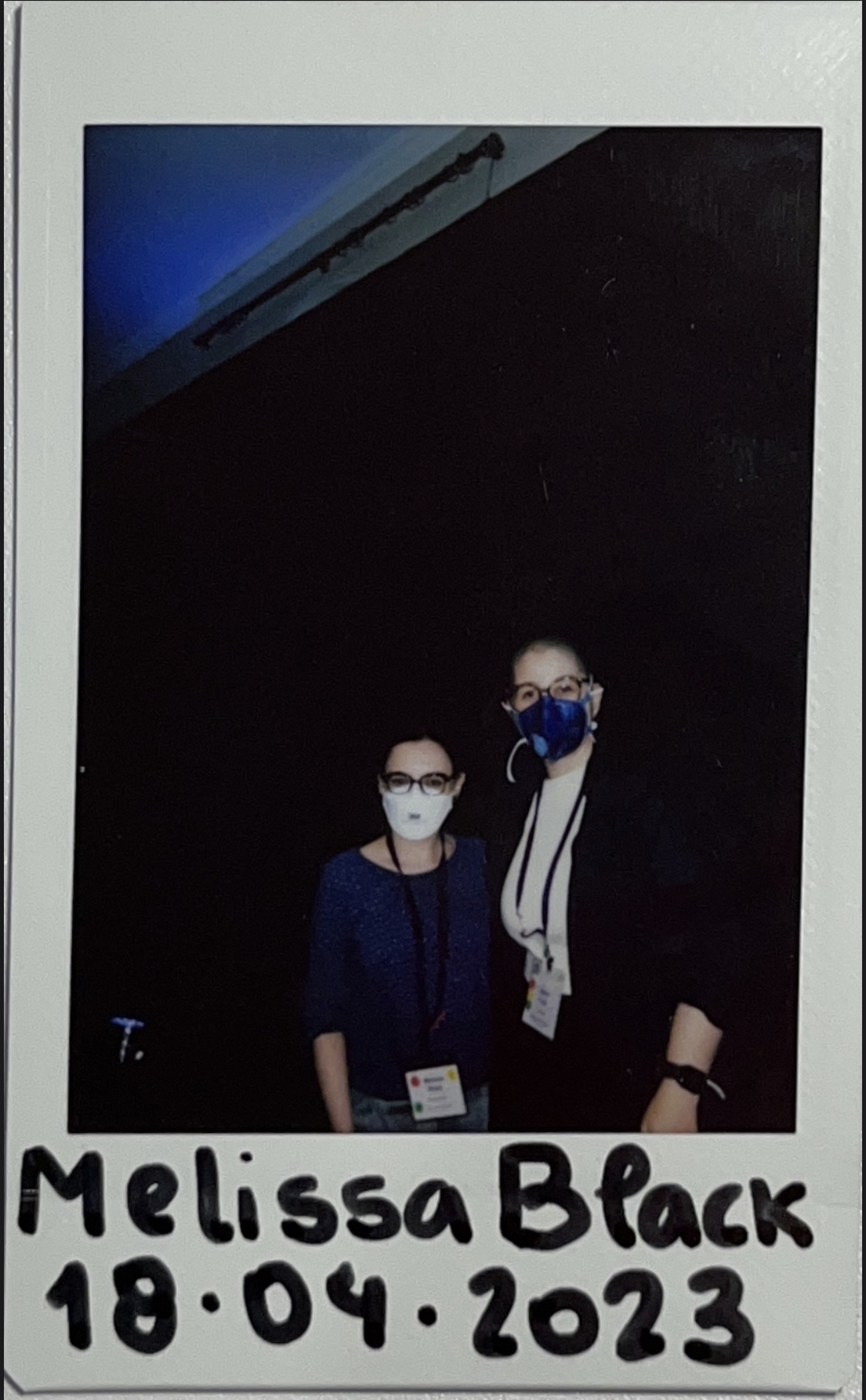
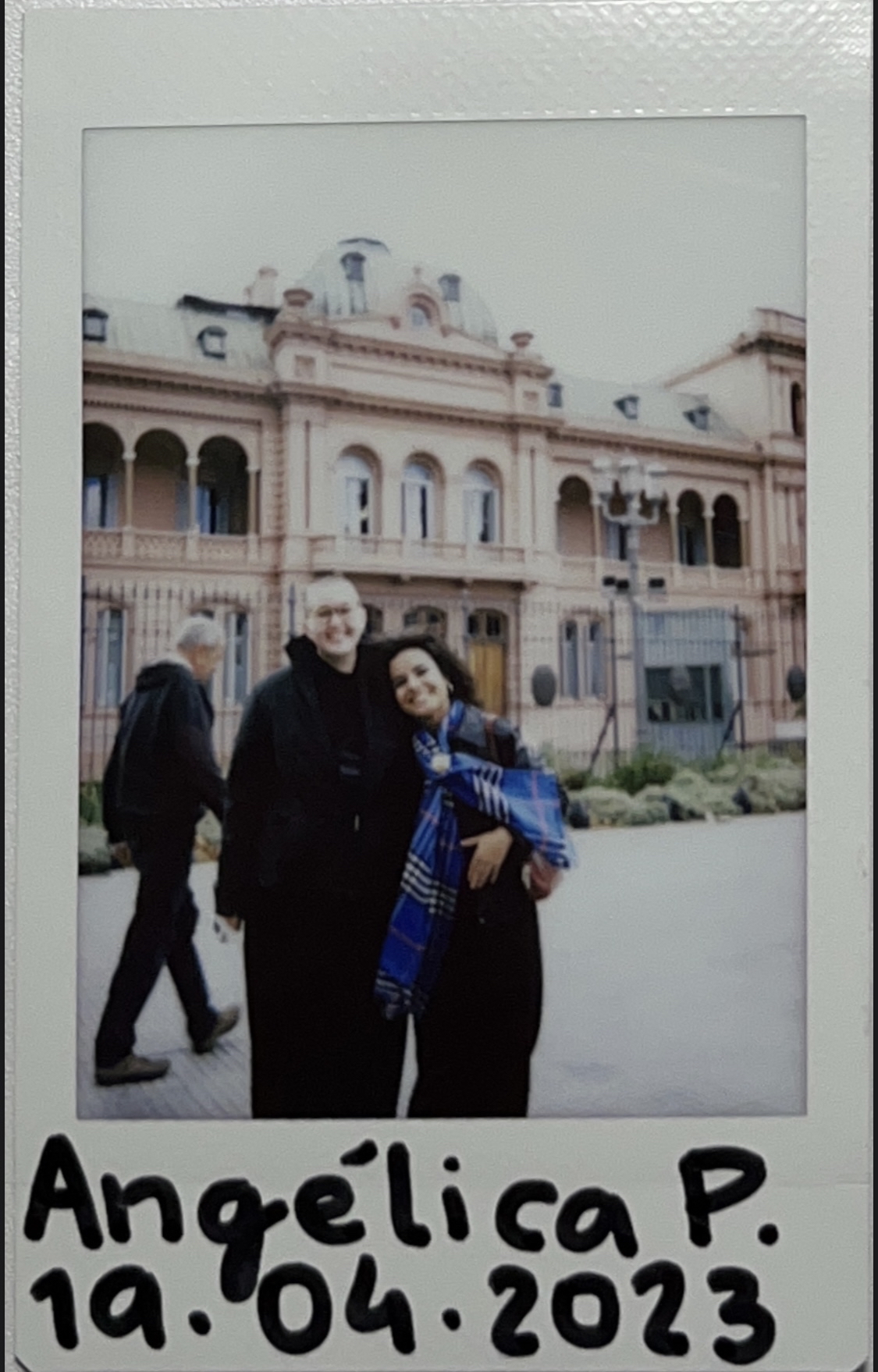
3 out of my 5 years as an Outreachy organizer were spent in isolation due to the pandemic. For the longest time, I didn’t have the opportunity to meet any of our alums in person after they finished the program. I’ve always thought I was missing out all the fun—but not anymore. During this trip, I finally met Melissa Black (Outreachy alum with EDAM Ontology) and Angélica Pagès (Outreachy alum with Open Archive). I couldn’t help but remember Marina and her extraordinary kindness during the time I spent with them.
You may have noticed that every photo on this post is in film. After being gifted an Instax Mini 90 by a fediverse follower, I’ve tried to connect more with the places I visit by taking analog pictures. For that reason, when I meet someone dear, I always take two Instax photos: one for them and one for me, as a way to thank them for the time we spent together.
This trip felt like the first morning of summer after a very cruel winter. I’m so thankful for my time in Buenos Aires, and especially for being trusted to attend such an important meeting. I’ll cherish those memories forever.
